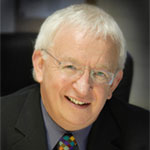
Edward Gregson
Born 23 July, 1945
By Tim Reynish
In 1996 the Royal Northern College of Music in Manchester announced the appointment of Professor Edward Gregson as Principal in succession to Sir John Manduell. Edward Gregson's connection with the RNCM is lengthy; for many years he was on the jury for the BBC Young Musician of the Year competition, which was held at the College. In 1984 he conducted the RNCM Wind Orchestra for the first time in the world premiere of the wind band version of his Tuba Concerto with the late John Fletcher as soloist, and shortly before being appointed, he made a recording of his wind works for Doyen with the College Wind Orchestra.
Edward Gregson's early mentor at the Royal Academy of Music was that great teacher, composer, pianist and Marxist, Alan Bush. There is no doubt that Bush must have given Gregson a thorough academic grounding, and also, perhaps subconsciously, the need to write music which speaks to its audience. Writing in Classical Music in a repertoire guide in 1990, Lewis Forman summed up the characteristics of his music: infectious rhythms, bold gestures, a mastery of the haunting motif, a catchy tune, brilliant colourful writing for the wind band.
Forman feels that Metamorphoses (Novello/Music Sales, 1979) can be seen as a turning point in Gregson's work, making a conscious move away from his brass band roots. In 1981 it was performed at the first International Conference for Wind Bands, held at the Royal Northern College of Music, emerging probably as the strongest contemporary work of the conference. The next twenty five years, especially since the founding of the British Association of Symphonic Bands and Wind Ensembles in 1981, have seen a regular flow of works, each very different, placing Gregson amongst the foremost composers for the medium of wind orchestra.
His Tuba Concerto (Novello/Music Sales 1976) is now firmly in the international repertoire. Scored originally for brass band, it is now available with wind band or with orchestra accompaniment, and many find its wind orchestration less dense and better balanced than the brass version.
Festivo (Novello/Music Sales 1985) is certainly one of the most successful works of its type. The opening declamation on fourths and seconds immediately brings to mind dozens of band works starting with this formula; Gregson however transforms the band cliché, what might have been banal becomes striking and memorable, and he builds up the final pages with the rhythmic drive of a Stravinsky score.
The brilliant showpiece Celebration (Maecenas, 1991) written for the Royal Liverpool Philharmonic Orchestra, is scored for orchestral wind, brass and percussion, with harp and piano; the sound world is that of the first movement of Tippett's Concerto for Orchestra, known as a separate piece Mosaic (Schotts) Both are in effect concertos for each orchestral; section. The character of each\group is well defined, and the effortless combination of the elements in the final pages reminds us of Gregson's academic role, assumed, as always, lightly.
The Sword and The Crown (Studio, 1991) is a re-working of material used in the Shakespeare History plays at Stratford-on-Avon; here again, simple yet effective characterisation effortlessly sets the scene, a welsh folk tune for harp and clarinet, a snatch of plainsong, the use of shawms, off-stage trumpets resounding over the battlefield.
It is this "common touch", the happy knack of a memorable phrase, which inspires the Missa Brevis Pacem (Novello/Music Sales 1988), the first major addition to the popular repertoire for voices and wind orchestra since Honneger's King David. Scored for boys choir SSA, with treble and baritone soloists in one movement each, the work is a truly heartfelt setting of the traditional words of the Mass, with a central poem by his wife, Susan Gregson, evoking the horrors of war, and a setting of the Benedictus for solo treble which has the potential to hit the charts if marketed aggressively.
The Berkshire Youth Wind Orchestra, conducted by Robert Roscoe with Gregson as soloist, premiered his Concerto for Piano and Wind (Maecenas) in 1995 at the RNCM but it was later extensively revised. It is subtitled Homages and bears the mark of both Bartok/Stravinsky modernism and Rakhmaninov romanticism in its influences.
His subsequent large-scale orchestral works, the Clarinet Concerto (Novello)/Music Sales) and the Violin Concerto, both demonstrated a great warmth and romanticism, less familiar elements in his wind music which glitters and fizzles. This is certainly true of his most recent work for wind,The Kings go Forth (Studio). Like The Sword and the Crown, it is again based on his music for the Royal Shakespeare productions of the historical players. The work was a commission from the Royal Air Force Music Services and a consortium of American universities; again Gregson touches a populist chord with his jazz version of Sumer is icumen in, juxtaposed with plainsong, folksong and all of the panoply of renaissance battle music.
Of the leading composers active in this genre in the eighties and nineties, Gregson's output is larger than that of Richard Rodney Bennett, more challenging than that of Guy Woolfenden, more varied than that of David Bedford and Philip Wilby; all five composers have created a series of wind scores which can stand comparison with the great works of Holst and Vaughan Williams of the early part of the twentieth century, and they paved the way for the younger composers such as Adam Gorb, Martin Ellerby, Nigel Clarke, Kenneth Hesketh and Stephen McNeff.
With the release in the nineties of professionally produced compact discs of wind music by Bennett, Woolfenden, Bedford and Gregson, played by the Royal Northern College of Music Wind Orchestra, we can view their work as a whole and assess their contribution to the world of wind music of the last two decades of the century.